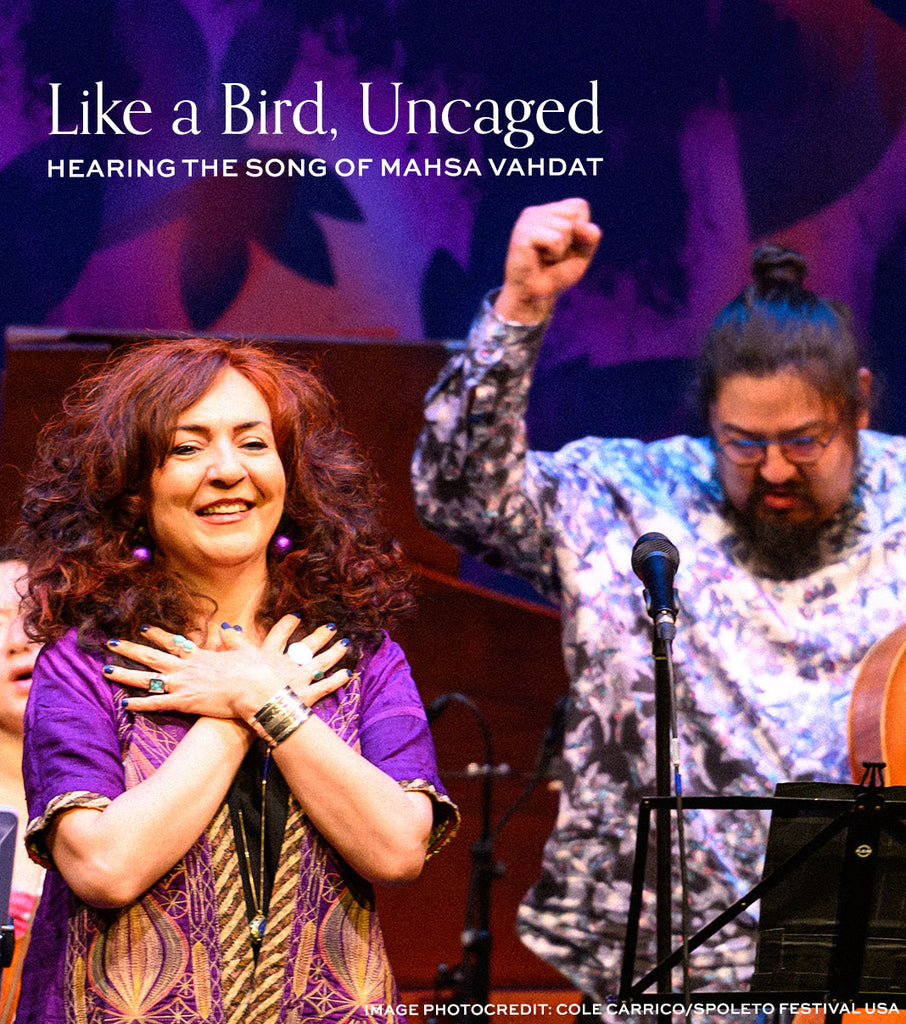Ibulliance: Like a Bird, Uncaged Hearing the Song of Mahsa Vahdat

Sitting in the darkened theatre, having just sprinted through the pouring summer rain and sunk, dripping, into my seat, the Chamber Music program begins. Each year, during the Spoleto Festival's seventeen days of theatre, opera, dance, symphony, folk, blues, jazz—the whole panoply of performance and visual arts—Charleston burns with the energy of a city on fire; and I am lit by it. Here, now, is Mahsa Vahdat, 2025 Composer-in-Residence, emerging onto the stage for a World Premiere of her new work.
Draped in a rich embroidered robe with silver rings and bangles glinting in the stage lights and a waterfall of henna-rich hair, Mahsa sings. Burnished with the inflections of her Iranian home, her voluptuous voice is round and ripe as fruit. She is pulsing the low sounds of it, now, like waves lapping over the beach of us. Behind her, two violins, a viola, cello, and bass paint a deep night sky to the moon of her voice. She lights the theatre with Rumi's mystic poetry set to this undulating silvery sound.
For a moment, I'm in the mystery of a Persian garden, lush with romance and longing. But Mahsa is no longer welcome in that garden. In 1979, when she was six years old, the Iranian Revolution put restrictions on the female solo voice, so that although she studied her own musical tradition from masters at the Tehran University of Arts, Mahsa had to leave the home she loved if she was to make her own music, and to find an audience, as around the world she has, who welcome her supernal voice.
When Mahsa was eleven years old, her mother braided her long abundant hair and covered it, as required, with a veil. Taken to visit her uncle, in prison for political reasons, her mother managed to slip him and his friends a glimpse of Mahsa's braids in a small act of defiance, a sign of hope that one day they will overcome the repression under which they live. It was a story that Mahsa carried with her, this moment of hope. But in 2021, when another Mahsa in Iran was beaten to death by the morality police for not adequately covering her braids, it became a sign of outrage and alarm sounding around the world.
Being forced to cover one's hair—or to cover one's voice—is a sign of the brutal veil behind which millions of women still bear their silence. Fearlessly, Mahsa Vahmat has sung in public venues around the world, defying the restrictions of her home, and raising the hope of women everywhere whose voices are stilled. She is the braid flinging itself into the light. She is the song that will not be muffled, or killed.
The audience is offering its thunderous applause, cheering Mahsa, her brilliance in keeping the Persian tradition of music alive through her own creative innovations, dressing its long history in new threads, and lifting her voice like a bird, uncaged. How like the many women of Ibu, I think, who carry the proud traditions of their people in their hands, even as their lives are veiled. I swell to think that our movement will not stop until the light of women can be seen in public without fear. That we will not stop until the truth and beauty of women's voices can be heard in every garden, in every music hall, and at every kitchen sink, around the world.
All the Best,
Susan Hull Walker
Creative Director + Founder


